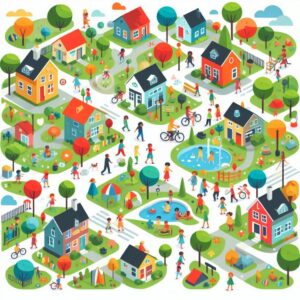 The parable of the Good Samaritan from the Gospel of Luke is one of the most well-known passages of scripture in Christian communities and beyond. Jesus shares this parable in response to a lawyer asking if God requires that we should love our neighbors as ourselves, then who is my neighbor? The parable can be summarized this way: a Judean man is walking down a dangerous road and is robbed and beaten. He is left hurt and in need of help. A priest walks by, sees the man and walks on the side of the road to avoid him. A Levite, or worker from the local Temple also walks by and does nothing to help. Then a Samaritan man, who was a religious, historical, and cultural enemy of this Judean man, sees him in distress. The Samaritan stops, picks up the man off the road, takes him to a local inn and pays to have him rest and recover there. He promises to pay the inn keeper whatever is necessary for the man’s stay beyond what has been paid when he returns. Jesus turns the question back on the lawyer and asks which of the 3 men in the story acted as a neighbor to the injured man? The lawyer responds “the one who has shown mercy.” And Jesus responds “go and do likewise.”
The parable of the Good Samaritan from the Gospel of Luke is one of the most well-known passages of scripture in Christian communities and beyond. Jesus shares this parable in response to a lawyer asking if God requires that we should love our neighbors as ourselves, then who is my neighbor? The parable can be summarized this way: a Judean man is walking down a dangerous road and is robbed and beaten. He is left hurt and in need of help. A priest walks by, sees the man and walks on the side of the road to avoid him. A Levite, or worker from the local Temple also walks by and does nothing to help. Then a Samaritan man, who was a religious, historical, and cultural enemy of this Judean man, sees him in distress. The Samaritan stops, picks up the man off the road, takes him to a local inn and pays to have him rest and recover there. He promises to pay the inn keeper whatever is necessary for the man’s stay beyond what has been paid when he returns. Jesus turns the question back on the lawyer and asks which of the 3 men in the story acted as a neighbor to the injured man? The lawyer responds “the one who has shown mercy.” And Jesus responds “go and do likewise.”
I taught this lesson to my adult Bible Study class a few weeks ago in the context of talking about how we treat people who come from a different religious tradition from us. I pointed out that this was like a white man helping a black man injured on the side of the road in 1920’s Georgia. The parable was meant to be that striking of a reminder to care for people who are different than us. Our Bible study has people who are in the 30s and 90s, black and white, men and women, many liberal and some more conservative, ministers and members, professors and students all on a zoom every week. We are a diverse group to put it bluntly. But whether we agree or disagree we have chosen to be a part of this Christian community and keep showing up to talk, study, and pray together every week.
We decided to talk about faiths beyond Christianity because of an experience a few members shared. They attended an interfaith wedding where I was the celebrant. The experience raised a lot of questions and a desire to learn from one member who wanted to know more about other religions. After asking the group if they were open to it, we agreed and included it in our regular Bible study time. During our second discussion we talked about visiting a Hindu Temple, and one member voiced that she wouldn’t want to do that because she is not Hindu. Another said that she felt very comfortable because God could be there just like God was in our church. I encouraged them that they were both right, that they could respect Hindus that worshipped in a Temple and not have to go themselves. But if they did choose to go, it didn’t make them less Christian, just having a different experience.
Being a good neighbor is not about agreeing on the same things or sharing the same identities. Being a good neighbor is about how we treat each other. Being in a diverse community can sometimes make us more intolerant of people who are intolerant. I have heard it explicitly from some of my members. But the things we practice in well response are curiosity and welcome. When the Hindu man who was dating a Christian woman came to our congregation months before they were married, we didn’t single him out or question why he was there. We hugged him and offered him food. He came because someone he loved, loved us. When a Jewish Rabbi spoke to us about her pain remembering October 7, and a Christian activist talked about his disgust at the suffering by Palestinians in Gaza in the same worship service, my pastor didn’t apologize. He let them both speak. I know our congregation is unusual. But it is a constant reminder and challenge of the possibility to be together despite differences. I can only hope that as we march toward and through this season of deep division in our country around the election, people who are in communities together whether by location or intention would remember on the other side that we all still need to eat. We all still need care when we are hurt. And we can all still be good neighbors by showing compassion.
